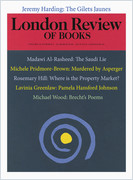Among the Gilets Jaunes
When they gathered at roads and roundabouts at the end of last year, the French government was caught off guard. Within a week of their first nationwide mobilisation, they were turning out regularly at intersections across the country to slow up traffic, and marching through Paris and the big provincial cities. Hasty polls announced that 70 or 80 per cent of the population, including many in France’s largest conurbations, supported this massive show of impatience. Yet the gilets jaunes first came together beyond the margins of the major cities, in rural areas and small towns with rundown services, low-wage economies and dwindling commerce. They were suspicious of the burgeoning metropolitan areas. Among them are people who grew up in city centres but can no longer afford to live in them: these barbarians know where they are when they arrive at the gates. More
The Saudi Lie
If Saudi progress is to be measured against Western models, then we had better be sure we measure everything – not just the words of a prince, or how excellently he adheres to McKinsey’s economic plans. Behind all the distorted coverage of Saudi Arabia, it seems to me, is an exoticising assumption: they’ll never be quite like us, though they deserve extravagant praise for trying. But Saudi Arabia is a country like any other. Autocracy and dictatorship are not its natural or inevitable forms of government. Journalism that celebrates incremental reform while ignoring the structural problems of life under absolute monarchy is no help. But I imagine most of the part-time Saudi-watchers would be horrified at the thought of a real revolutionary change that might eventually lead to a restriction of the powers of the monarch, or even the monarchy’s abolition. More
Pamela Hansford Johnson
Johnson published a scandalous, bestselling novel at the age of 23. By the time she married C.P. Snow, her second husband, she had written 13 books. The biographical note to these new Hodder editions says, somewhat slyly, that ‘for thirty years they formed an ambitious and infamous couple.’ The Encyclopaedia Britannica summarises her as an ‘English novelist who treated moral concerns with a light but sure touch’, as if she were being praised for her pastry. Johnson’s writing is more industrial than domestic. More
Murdered by Asperger
Why is ‘Asperger’s syndrome’ such a part of our lexicon? Why did its use take off in the mid-1990s? One reason is that Asperger’s thesis was translated into English by Uta Frith in 1991, without its Nazi intellectual frame (the preface); Frith also avoided his term ‘autistic psychopathy’, translating it simply as ‘autism,’ an act of linguistic de-Nazification. But there’s more to it than that. Edith Sheffer is clear: autism in its severe forms is about underlying biology; but what we now call Asperger’s syndrome is a cultural artefact. More
LATEST AUDIO
On our new podcast, Joanna Biggs, Tom Crewe, Patricia Lockwood and John Lanchester assess the online world. Listen »
Seamus Perry, Mark Ford and Joanna Biggs consider the balance of biography and mythology in Sylvia Plath’s work. Listen »
LATEST VIDEO
Christopher Clark talks, and sings, about the Revolutions of 1848. Watch »
James Meek interprets the dreams of Leavers and Remainers. Watch »








